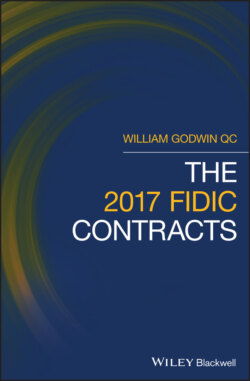Читать книгу The 2017 FIDIC Contracts - William Godwin - Страница 16
1.3.2 Errors in Employer's Requirements
ОглавлениеThe 1999 Yellow and Silver Books impose on the Contractor the obligation to design, execute and complete the works in accordance with the Contract so that when complete the works will be fit for the purposes for which they are intended ‘as defined in the Contract’ (clause 4.1). This is similar in the 2017 editions, except that the works when completed are to be fit for the purpose or purposes for which they are intended ‘as defined or described in the Employer's Requirements’ or, where no such purposes are defined or described, fit for their ‘ordinary purposes’.
Thus the fitness for purpose obligation in the 2017 editions is anchored, not in the Contract generally, but in the Employer's Requirements or, in default, in the ‘ordinary purposes’ of the relevant works. These important distinctions are examined in Section 4.1 below.3
The extent to which the Contractor has to accept responsibility for errors in the Employer's Requirements, including any design criteria and calculations, is markedly different between the two forms.
In both editions of the Silver Book the Contractor is responsible for errors in the Employer's Requirements even if the Contractor could not reasonably have been expected to detect them, with certain limited exceptions. Clause 5.1 in both editions provides that the Contractor is assumed to have scrutinised, prior to the Base Date, the Employer's Requirements (including design criteria and calculations, if any) and the Employer is not to be responsible for any error, inaccuracy or omission of any kind in the Employer's Requirements as originally included in the Contract, unless one of the exceptions set out in sub‐paragraphs (a)–(d) of clause 5.1 applies. These exceptions are examined in Section 5.1.1 below.
The Yellow Book deals with errors in the Employer's Requirements quite differently. The Contractor is entitled to claim additional time and/or cost plus profit if a hypothetical experienced and careful contractor would not have discovered the error by a certain date.
Thus clause 1.9 of the 1999 edition entitles the Contractor to claim if delay and extra cost result from an error in the Employer's Requirements which an experienced contractor exercising due care would not have discovered when scrutinising the Requirements under clause 5.1. Although more detailed and differently structured, clause 1.9 in the 2017 edition applies a substantially similar test to determine the Contractor's right to claim more time or money in respect of errors contained in the Employer's Requirements.4
